7 + 1 ways to tell if your company lives in the 21st century
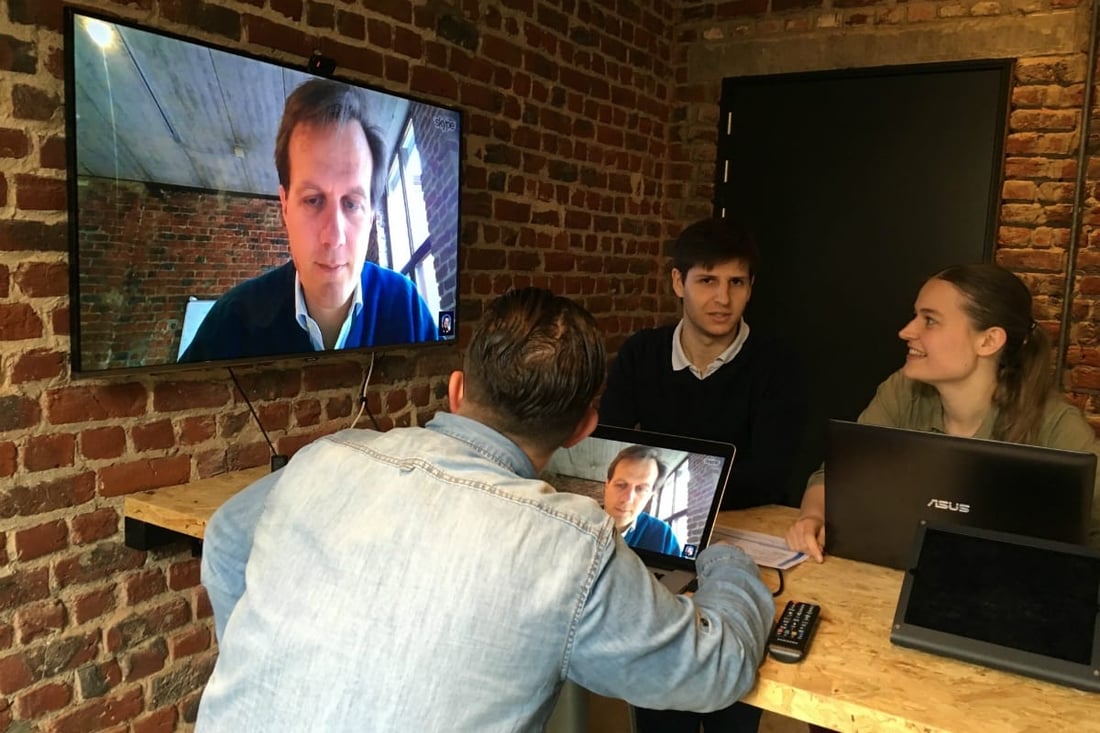
When a journalist asked me a few weeks ago to name a true novelty in the business world of our times, I had to pause and think. Then I remembered a Skype call I had some time ago with Chris Osborne from Foundersgrid.
Chatting from his Bangkok hotel room, Chris told me that he had spent the last two months managing his US-based company from Thailand and was about to move to Tokyo for the next two months. “I am not alone - he added - there are approximately 500 such entrepreneurs in Bangkok”. This is when I first heard of a new breed of start-uppers: the ‘travelling entrepreneurs’.
They run their companies from wherever they want to be on Earth, changing location every few months. They basically live and work via the Internet. Their revenue comes from clients they never meet and their team members are either travelling with them or located elsewhere on the planet. They are burying the 9-to-5 mentality which shaped the 20th century in favor of a more flexible, adaptable, mobile one.
At Proxyclick we are not travelling entrepreneurs: some of us have family and kids which would make it quite challenging. Still when I talk about our working habits to friends working in large corporations they look at me with a mix of incredulity and envy.
This inspired me to list seven traits of 21st century corporations. I added a bonus one which is only applicable to some companies.
1. Flexible workspace and working times
The so-called 'New World of Work' (#NWOW) is not exclusive to tech companies any more (another similar buzz word is Agile Working). You see it happening in all industries with new initiatives like: sit wherever you want, work from co-working spaces, work from home, open space with relaxed areas, meeting rooms which don’t look like meeting rooms…
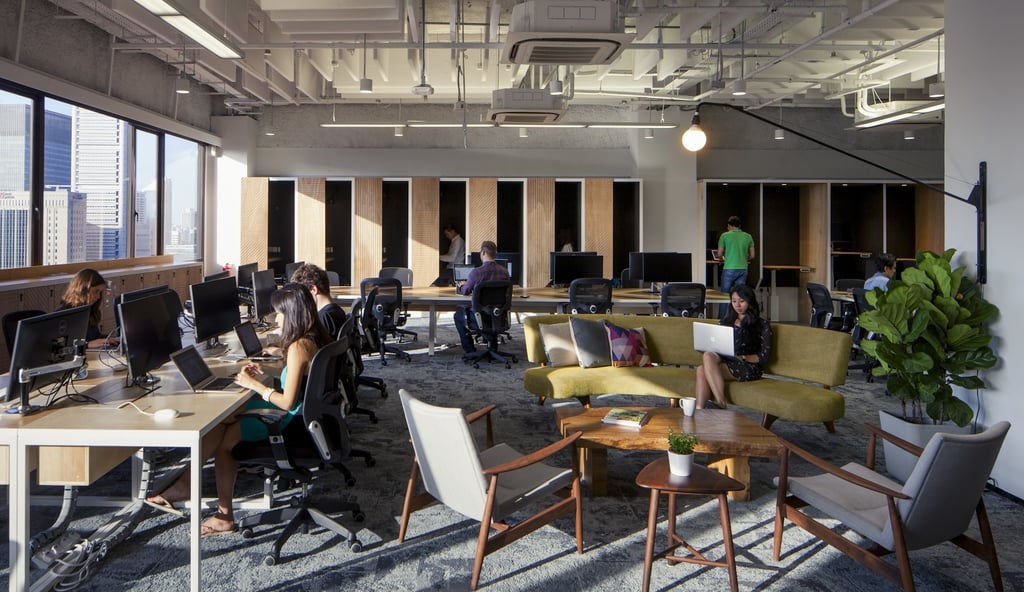 Airbnb offices in Singapore
Airbnb offices in Singapore
Activity-based working means that there is a dedicated space for each type of office activity: concentration, meeting, fun, phone call or lunch.
It’s all about the end result and not about being at the office from 9 to 5 every day.
2. Customer centric
In the late 90s, I spent 4 years in Germany working for a large multinational with over 400,000 employees globally. Customers were a remote concern as there were subsidiaries who themselves were selling to resellers and end customers.
It was all about us: our company, our team, our product, our needs, our business unit.
Suddenly, I wasn’t surprised when this telecom hardware giant ended up missing the smartphone revolution. Despite having a business unit of 20,000 people building mobile phones and another of 20,000 people building computers, they were not listening to what customers wanted.
Another example is this reply I got from a French website. In it they’re saying:
- We have received your message
- We’ll do our best to respond within… 48 hours!
- Do not respond to this email

As a recipient of this message I feel like they don’t really care about their customer, they care more about me respecting their process than about giving me a reply. Not what you would call customer centric...
Luckily things are changing, 21st century corporations have put customers at the center of everything. As an example Basecamp customer support team once apologized to me for “taking so long to respond to your question” because I had to wait for... 35 minutes.
In today’s world you are immediately punished and rewarded by customers. The word customer is actually losing its meaning, a customer is now a partner, he is almost part of the company.
3. Quality centric
Modern brands are so close to their customers that they are quickly getting feedback and learning from it, having to adapt or die. We see it happening over and over, incumbents are sitting on their current product offering not listening to customers changing needs, all the while the markets are shifting.
Top-class quality centric corporations have products that sell without sales teams. The product is the ‘hero’. Product development teams of these companies are so tuned into market needs that it’s the actual usage of the product which convinces prospective buyers to become customers.
4. Hybrid team structure
When asked how many people work at Proxyclick I always struggle with the answer. Our team at Proxyclick is ‘hybrid’ in the sense that it’s made up of employees, freelancers and of what would formerly have been called suppliers (ie. companies providing us with their service), we prefer to call them team members.
Employees are located in Belgium and they work from the office or from home. Freelancers are based in multiple countries (USA, India, Argentina, Honduras, Belgium…), some of them we have even never met.
We hire new team members thanks to recruiting websites like We work remotely. If we need help for a specific short term mission we find consultants through Upwork, which gives access to a huge pool of freelancers in a matter of minutes.
There are four special ‘suppliers’ which are part of our team, each of them has several people working part-time on Proxyclick projects:
- Central is our design team, they create fantastic user experiences. We love the way they challenge the team and push our product to the next level
- Xander Marketing is our marketing team, they help us build and run our campaigns, measure our effort and come up with new ideas
- RiseUp is our mobile development team, their commitment to build an outstanding product for our users is demonstrated every day
- ComodIT is our IT infrastructure team, they help us build a scalable platform and are obsessed by automation
Gone are the days when buying something from one company meant that 100% of the product was built by that company. 21st century products and services are built by multiple parties located in multiple locations, each bringing a specific expertise to the table.
5. Intensive use of latest communication technologies
Flexibility, customer centric, quality focus and hybrid team structures are impossible to achieve without outstanding communication, which in turn is only possible thanks to technology. Allow me to illustrate #4 by sharing the technologies we use at Proxyclick.
Skype is the ‘grandmother’ of all these technologies. At Proxyclick we interview and sometimes hire new recruits on Skype. We have daily team meetings on Skype.
Our new meeting room is even designed around the needs of remote meetings and presentations. We make demos of our visitor management app to Australian leads in the morning and to US leads in the afternoon using join.me to speak, see each other and share screens.
Efficient team collaboration would not be possible without Basecamp and Slack. Basecamp allows us to discuss and share project status, it’s a sort of project news board complemented with calendar and to-do lists. Slack is a business chat platform which includes discussion channels and integrations with other platforms such as Twitter for instant notifications.
Our customers can even chat to us when they are logged in. We use the Intercom in-app communication service, to interact directly with our customers. They have a smartphone app which gives our Customer Success team great flexibility: we can answer leads or customers queries wherever we are.
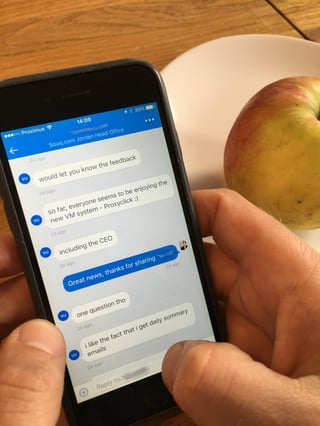 Chatting from anywhere with a customer currently logged into Proxyclick
Chatting from anywhere with a customer currently logged into Proxyclick
There is no need to travel around the world to meet our customers and partners, we have established strong ties with people thanks to these technologies.
6. Sense of purpose
Employees are looking for more than just a job with a salary and considering other factors when choosing an employer. When surveying young people in it’s 2016 Millenial Survey Deloitte found out that 87% of Millennials believe that “the success of a business should be measured in terms of more than just its financial performance” and that "business should put employees first as well as have a solid foundation of trust and integrity". Not surprisingly customer care and high-quality, reliable products also ranked relatively high in importance.
 Source: Deloitte
Source: Deloitte
Some real world examples of this include companies like Whole Foods, who created Community Giving Days where 5% of that day’s net sales are given to local non-profits.
Or Virgin who have put the employee at the centre of everything they do. "If the person who works at your company is not appreciated, they are not going to do things with a smile", Branson says. Happy employees are the best advocates for your service, so putting them first benefits employees, customers and shareholders.
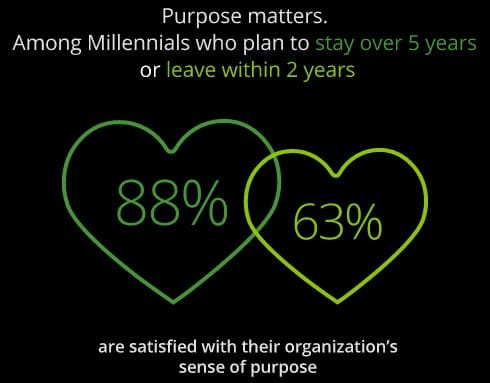 Source: Deloitte
Source: Deloitte
These companies and others like them are finding success through creating a sense of purpose, and showing staff that they are more than just a cog in the machine.
7. Self-management
Experts in human organizations claim that we have reached a new stage in collaboration: self-management. According to Frederic Laloux the future of management is teal, replacing the traditional top down hierarchal management systems.
Image below taken from the book Reinventing Organizations shows the 5 stages of human organizations.
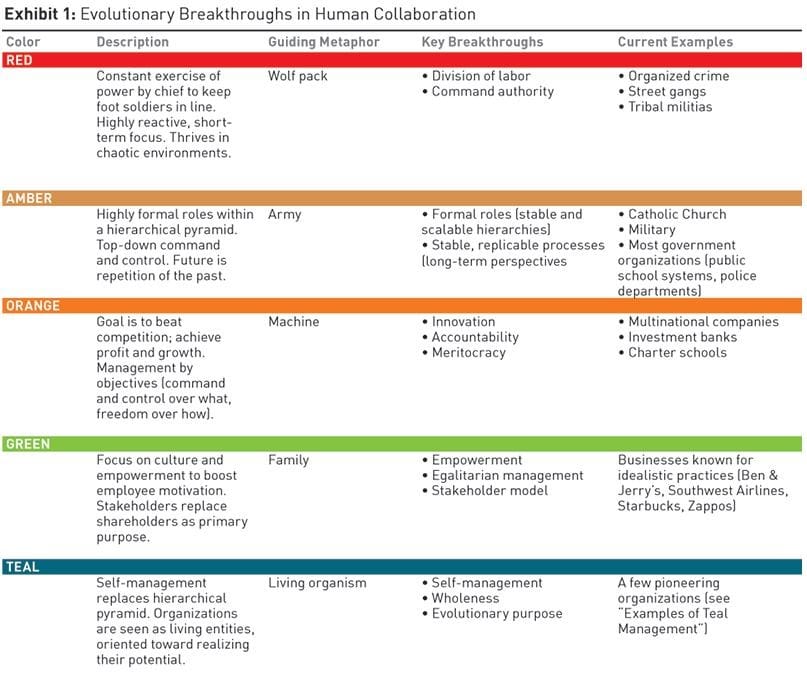 Source: Frederic Laloux, Reinventing Organizations
Source: Frederic Laloux, Reinventing Organizations
21st century corporations can be compared to living organisms made up of multiple parts communicating and working with each other in order to maximize the organism’s potential.
8. Bonus: total mobility
If you are a tech company with a product that is cloud based, and if both your customer base and market are global you can add the following trait: total mobility, or at least the idea of it. Total mobility means that everyone in the company can suddenly move elsewhere on the planet without it affecting the business. That’s the case of Chris and Foundersgrid.
Another example was given by one of our team members who had a Skype interview with the CEO of a 200 person strong company, where everyone was working from home across more than 50 different countries.
I have lost track of where Chris is, all I know is that I can access his company’s services at any time from the web, and that if I contact him he’ll reply when he can.
When confronted with 20th century minded corporations I often struggle with their mentality and I doubt I could ever be working in a similar environment again.
In which century is your company living and operating?



